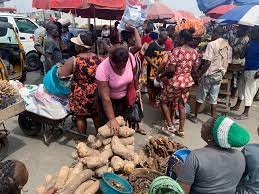
Nigeria's inflation rate for September surged to 26.72%, marking a substantial 0.92% increase compared to the previous month's 25.80%. This data is sourced from the recently released Consumer Price Index (CPI) report by the National Bureau of Statistics (NBS).
The steep rise in inflation can be primarily attributed to two significant factors. First, the removal of petrol subsidies has resulted in an increase in fuel prices, affecting various sectors of the economy. Second, the devaluation of the official exchange rate has led to higher import costs, which have rippled through the consumer market, impacting prices.
Month-on-month inflation, which reflects the price changes within a single month, rose to 2.18% in September, marking a 1.08% difference from the preceding month of August.
Year-on-year inflation contributions reveal that food and non-alcoholic beverages accounted for the most significant share at 13.84%, followed by housing, water, electricity, gas, and other fuels at 4.47%, and clothing and footwear at 2.04%.
The data also indicated that urban inflation reached 28.68% in September 2023, a significant increase from 21.25% recorded in September 2022. Rural inflation stood at 24.94%, indicating a 4.62% increase from 20.32% in 2022.
Food inflation experienced a sharp rise to 30.64% in September 2023, which was a 1.30% increase from the previous month and 7.30% points higher than the corresponding period in 2022. Factors contributing to the drop in month-on-month food inflation included reduced growth in the average costs of items like potatoes, yam, and other tubers, bread and cereals, fruits, as well as fish.
The "All items less farm produce" category, which excludes volatile agricultural produce prices and energy, registered a year-on-year rate of 21.84% in September 2023, up by 4.35% compared to September 2022.
The report also details the inflation rates by state, indicating Kogi, Rivers, and Lagos with the highest year-on-year all items inflation rates, while Borno, Jigawa, and Benue reported the most gradual increases.
Food inflation statistics show Kogi, Rivers, and Lagos with the highest year-on-year rates, while Jigawa, Borno, and Sokoto reported more modest increases




